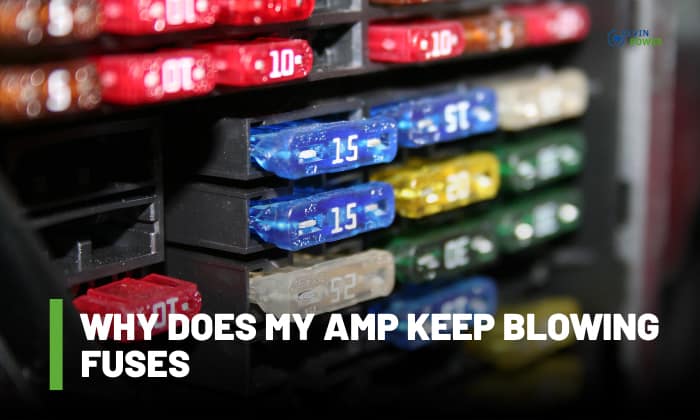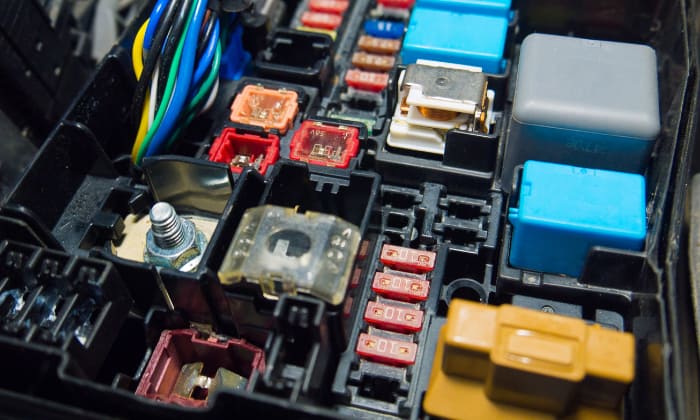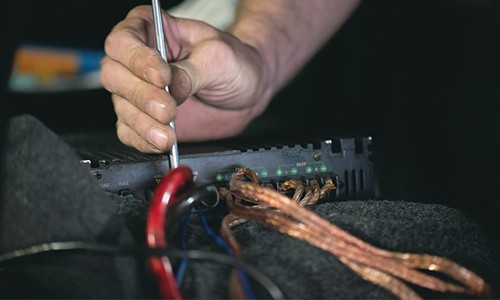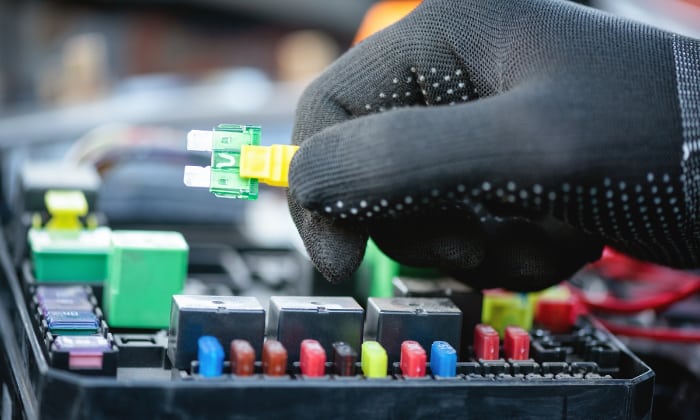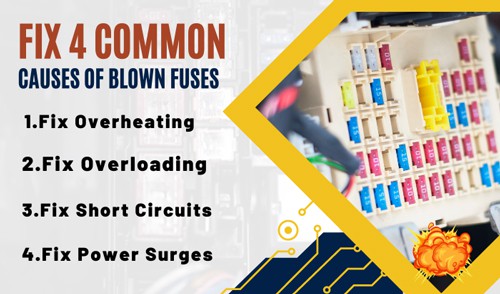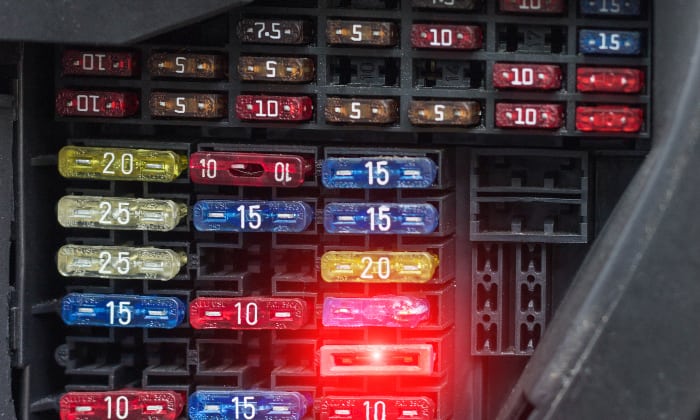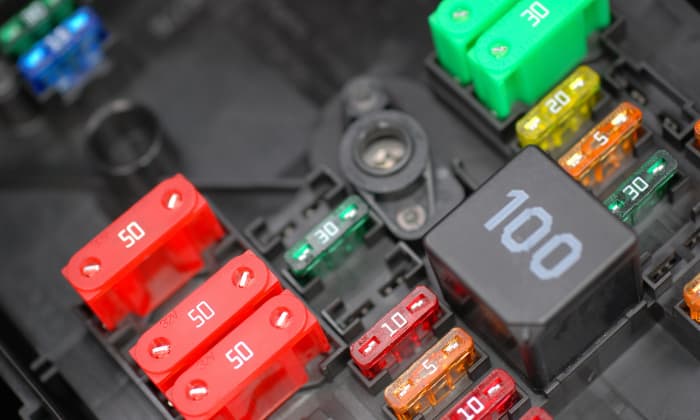Fuses can protect your expensive car amps or home theater systems from any surge of electricity in the circuit. But if your fuses kept blowing, then something might be wrong with either the amp or the connections.
Why does my amp keep blowing fuses? Is it really the amp that blows the fuses? Blown fuses in amps are usually caused by overheating, overloading, improper wire connections, or a faulty amp.
We’ll discuss these causes in detail below, so keep reading to learn more.
Table of Contents
Common Causes of Blown Fuses in Amp Circuits
1. Overheating
Overheating is usually caused by a current surge that blows the fuse, but it may also result from poor ventilation. Likewise, it is one of the symptoms of a faulty amp with damaged internal wirings, transistors, power supply, or other internal damage.
2. Electrical Overload
Too much load in your amp circuit can draw way more current than your fuses can handle and will have your amplifier fuse blown. Several cases could lead to an overloading amplifier.
For instance, if the amp does not match the speaker’s impedance, then it works harder until its internal fuse blows. Also, if the amp gain is set on high for too long, then it will draw more current than its designed power rating.
Overloading can also happen in your subwoofer amp. If your subwoofer fuse keeps blowing, the amp might be set at high volume for a long time.
3. Short Circuits
Short circuits happen when current flows to a path with very low resistance and bypasses other resistive elements in the circuit. This causes a current surge that can blow the fuse.
Loose or wet connections and damages on the insulation on the power wire and other conductors, among others, are possible sources of short circuits. These can cause other wires to come into contact with other wires. For car amps, short circuits may also happen when damaged wires touch the chassis.
4. Power Surges
A power surge can also blow amp fuses, especially for home theater amps. It can cause an overvoltage and push enough current to blow the fuse. A faulty alternator or battery is what causes power surges in cars.
Interestingly, amps can also have a surge during their startup, so they commonly use a time delay fuse or a slow blow fuse to handle the initial surge. A fast blow fuse blows immediately during this surge, so it’s not used.
Troubleshooting and Solutions
1. Safety Precautions
Observe the following points when troubleshooting blown fuses. But if you’re in doubt, contact a professional for the job:
- Make sure you turn off everything first.
- Keep your hands dry and wear rubber-soled
- Do not use fuses with a higher rating. If the 30 amp fuse keeps blowing, use a 30 amp fuse or lower for diagnosis.
2. Fix Common Causes of Blown Fuses
- Fix Overheating
Better ventilation can fix overheating to an extent. Amps should be installed in a well-ventilated area. A cooling fan can also be installed to improve ventilation.
However, overheating may also be a sign of underlying problems like short circuits and faulty amps. Resolving these problems may also fix overheating.
- Fix Overloading
Replace the speakers with an impedance that matches the amp. Also, lower the volume and adjust the amp’s gain to reduce the amp’s current draw at high volume or gain.
- Fix Short Circuits
Check for loose connections and damaged wire insulation. Seal with electrical tape to close any exposed wires. But consult professionals if you suspect short circuits.
- Fix Power Surges
In home theaters, surge protectors can help prevent overvoltage and protect the connected equipment. Some surge protectors can even protect against surges from lightning strikes.
In cars, a mechanic should check the alternator or the battery if you suspect a power surge. Faulty alternators or batteries should be replaced.
See the detailed guide on how to fix a blown fuse here!
Diagnosing a Blown Fuse
Diagnosing the reason for a blown fuse is best done by professionals. Should you see any of the following signs and symptoms, bring it to a professional:
- Sound system not working
- Whining, buzzing, or other distorted sounds
- Burnt scent
If you believe the fuse is blown, you can check the fuses along the circuit and locate the blown one. A blown fuse looks like a portion of the solder or conductor is broken or melted.
You can check the possible reason for the blown fuse in your car amps if you follow these steps. You’ll need multiple fuses to do this:
- Turn off all electrical components and replace the blown fuse. If a short circuit exists from that fuse up to your amp, the fuse will blow.
- Disconnect the amplifier and replace the blown fuse. The fuse will blow if a short circuit is due to faulty wiring.
- If the fuse does not blow, connect the amp, and turn it on. If the amp is faulty, the fuse will blow.
This is a simplistic way to diagnose your car amp’s fuse that keeps blowing. Remember, though, professionals can do this better.
Preventive Measures
You don’t have to let your amp or sub fuses keep blowing all the time. The following preventive measures can help you avoid blowing fuses when using your amps:
- Use the right fuse for the load.
- Make sure your amp has enough ventilation to prevent overheating.
- Your amp should be powerful enough to match your components to prevent overloading.
- All connections should be tight, and wires should not be damaged to minimize the chances of having short circuits.
- For cars, do regular maintenance and check for faulty components like the alternator and the battery to prevent power surges.
- For homes, surge protectors can help protect your amp fuses from power surges and possibly lightning.
Frequently Asked Questions
1. How do I know if a fuse is blown in my amplifier?
You experience some signs of a blown fuse, like the sound system is not working properly. If the fuse is external, you can check if the fuse has a gap in its metallic strip. But if the fuse is inside, you can have a professional check.
2. Can using incorrect fuses damage my amplifier?
Yes, if the fuse has a higher rating. If the fuse used has a higher rating, the fuse will allow too much current into the amp and damage it. The fuse won’t melt and won’t cut the circuit.
3. Is it possible to fix blown fuses myself, or should I seek professional help?
You can do it yourself if you know exactly what you’re doing, especially with external blown fuses. But we strongly advise that you seek professional help.
4. How do I tell if my amp is blown?
Ask a professional if you think the blown fuse is inside the amp or if the damage is a faulty amp. They would do a better job of fixing it.
Conclusion
Why does my amp keep blowing fuses? Several factors may blow an amp’s fuse. You can look out for some symptoms of a blown fuse so a professional can help you diagnose and fix your fuse issues.
But you can prevent a trip to the repair shop by simply installing the amps properly. Implementing these measures that would lessen the chance that your fuses will keep blowing because of your amps.

I am Edwin Jones, in charge of designing content for Galvinpower. I aspire to use my experiences in marketing to create reliable and necessary information to help our readers. It has been fun to work with Andrew and apply his incredible knowledge to our content.

